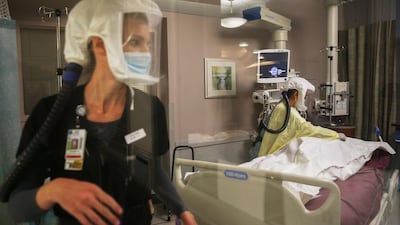The US faces a dire outlook for the Covid-19 pandemic as President Joe Biden moves to tackle the outbreak during his first full day in office.
More than 407,000 people have died from the disease, according to Johns Hopkins University, passing the 405,399 total US combat and non-combat deaths in the Second World War.
It marks a sombre milestone, because on January 21, 2020, exactly a year ago, was when the first known case of Covid-19 was detected in the US.
There was also a record number of daily deaths on Wednesday, January 20, when the Covid Tracking Project reported more than 4,400 fatalities.
Johns Hopkins University also recorded more than 4,000 deaths. The Wall Street Journal reported that this was the third day of 4,000-plus deaths on record.
The country is in a unique position: the US represents about 5 per cent of the world’s population but accounts for 20 per cent of the global Covid-19 death toll.
In a month, the US could hit half a million Covid-19 deaths, according to the Institute for Health Metrics and Evaluation at the University of Washington.
The institute also predicts at least 567,000 deaths by May.
"My fellow Americans, in the work ahead of us, we're going to need each other," Mr Biden said in his inauguration speech.
“We need all our strength to persevere through this dark winter. We're entering what may be the darkest and deadliest period of the virus.
"We must set aside politics and finally face this pandemic as one nation.”
While the outlook is grim, there are some positive signs, with indications that the number of people in hospital is decreasing, and vaccinations are continuing despite issues with distribution.
The Covid Tracking Project says there are about 122,000 Americans in hospital for Covid-19, down from a high of 132,000 earlier in the winter. New coronavirus cases are also declining.
The Centres for Disease Control recorded more than 16 million vaccinations in the US. The agency says 35 million doses have been distributed nationwide.
Sworn in as president on Wednesday, Mr Biden shared how he understands the pressing crisis of the moment, in terms of the economy and health.
He and Vice President Kamala Harris held a pre-inauguration memorial at the Lincoln Memorial Reflecting Pool on January 19 for the 400,000 people who have died.
Several US cities took part in the event and the National Cathedral in Washington tolled its bell 400 times in memoriam.
“Few people in our nation's history have been more challenged or found a time more challenging or difficult than the time we're in now,” Mr Biden said at the US Capitol on Wednesday.
“A once-in-a-century virus that silently stalks the country has taken as many lives in one year as in all of World War Two.”
On Wednesday afternoon, Mr Biden signed an executive order requiring people to wear a face mask and keep physical distance while on federal property.
He took the US back into the World Health Organisation, effective almost immediately, with Dr Anthony Fauci joining a WHO meeting on Thursday morning.
He signed an executive order to restructure the federal response to the pandemic, appointing Jeff Zients as response co-ordinator.
Earlier, as part of the presidential transition, Mr Biden presented a $1.9 trillion relief bill to Congress, which includes financial support for Americans and small businesses affected by the economic fallout from the pandemic.
It also features funding for Covid testing and vaccines.


